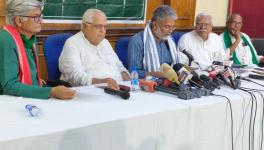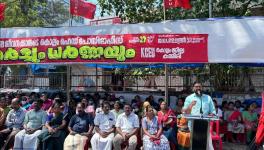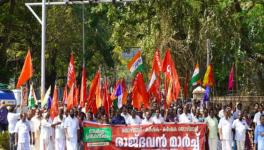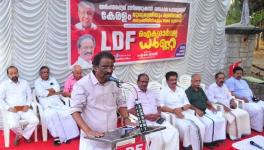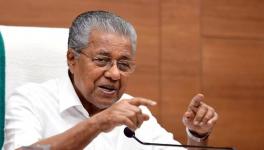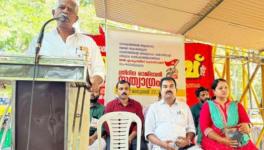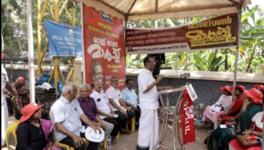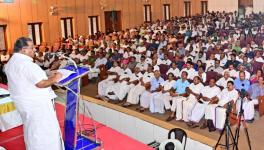Kerala: Employees Term Railway Privatisation ‘Anti National’, Plan Joint Struggles
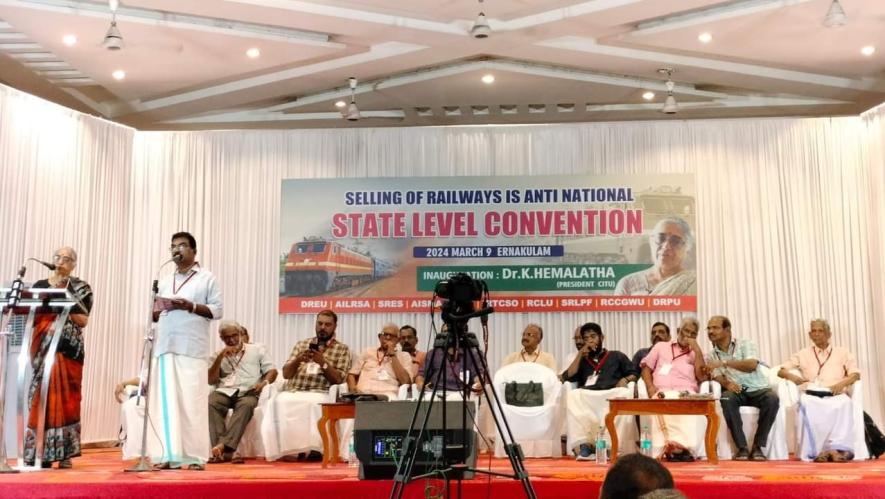
Dr K Hemalata, the national president of CITU, inaugurated the convention of the railway employees against privatisation held in Ernakulam.
The convention held by the coordination committee of the railway employees union decided to hold joint protests against the privatisation, contractualisation and outsourcing of the railways. The trade unions accused the Union government led by the Bharatiya Janata Party (BJP) of vehemently resorting to destroying the largest mode of transportation used by the rural population, including poor, marginalised and migrant workers.
The convention also slammed the ongoing privatisation and corporatisation moves of the union government, affecting the railway employees and the general public. The withdrawal of a separate railway budget, lack of funds or underutilisation of funds allocated for track renovation or maintenance, renovation of obsolete signal gears, and reduction of staff in the safety department have resulted in frequent accidents and loss of lives.
The corporatisation of the coach manufacturing units and roping in foreign multinationals to manufacture coaches for the much-hyped Vande Bharat trains are contradictory to the ‘Make in India’ campaign, and the self-reliance strongly advocated by the BJP-led government. The convention urged the Union government to stop the rampant privatisation of railways and electricity, two sectors considered crucial for the farmers, workers, rural population and the youth.
‘A SETBACK TO ECONOMY AND DEVELOPMENT’
The Indian Railways, with a strong network of tracks and services, remains the largest mode of public and goods transportation, and it is one of the largest public sector employers in the country. An estimated two crore people, including those from the rural and urban areas, daily wage workers, and migrant labourers, utilise the service to reach their workplace every day.
“With the BJP-led Union government accepting the Bibek Debroi committee recommendations, the Railways is going through a piece by piece privatisation and the abolition of the railway budget,” Dr K Hemalata, the president of the Centre of Indian Trade Unions (CITU), said while inaugurating the convention.
“Privatisation is not only related to railway employees and workers but is also closely associated with the public, economy, and the entire nation. The successive union governments, led by the Congress and BJP, following the neo-liberal policies, are equally responsible for the negative impact on railways, but the process was accelerated by the BJP regime in 2019,” she added.
The BJP-led government has already given the nod for the operation of private trains in selected routes and handed over railway stations to private operators, besides outsourcing track maintenance and signalling.
“We are witnessing exorbitant charges of fares in privately operated trains and high cost of platform tickets after the privatisation process began. If this continues, the concessions to senior citizens, women, cancer patients, and students will be brought to an end since the private players go after the profit and give less priority to service. The increase in fare would affect the poor people, and the private players will loot the passengers,” Hemalata said.
The closure of small railway stations, reduction of passenger trains, renaming of passenger trains as special express under the guise of COVID-19, and reduction of general and sleeper coaches in express trains are other retrograde measures adopted by the railways affecting the commoners relying on the services.
‘INCREASE IN ACCIDENTS, A WORSE SIGN’
The BJP-led government has been campaigning that privatisation has resulted in ensuring world-class services, high standards and facilities in the trains and stations, but the government’s data speaks otherwise.
“The number of accidents is increasing due to insufficient funds for track maintenance. The lack of coordination between signal, track, and operation could lead to disastrous consequences. When the government and railways are responsible for the accidents, the employees are made scapegoats, which cannot be accepted,” Hemalata added.
The number of vacancies in different railway departments is around 3 lakhs, which is another setback for the youth of the country who are longing for government employment.
Another major issue flagged in the convention was the attempts to hand over lands owned by the railways to private players under the pretence of developing infrastructure at throwaway prices.
“The BJP government launched the National Monetisation Pipeline (NMP) to create revenue from various departments including the railways. They are trying to hand over lands to corporate players at unimaginably low prices, whereas the public relying on such spaces would be shown the door. We have to wage joint struggles with the active participation of the general public to stop such loot by the union government in favour of the corporates,” Hemalata said.
Get the latest reports & analysis with people's perspective on Protests, movements & deep analytical videos, discussions of the current affairs in your Telegram app. Subscribe to NewsClick's Telegram channel & get Real-Time updates on stories, as they get published on our website.










